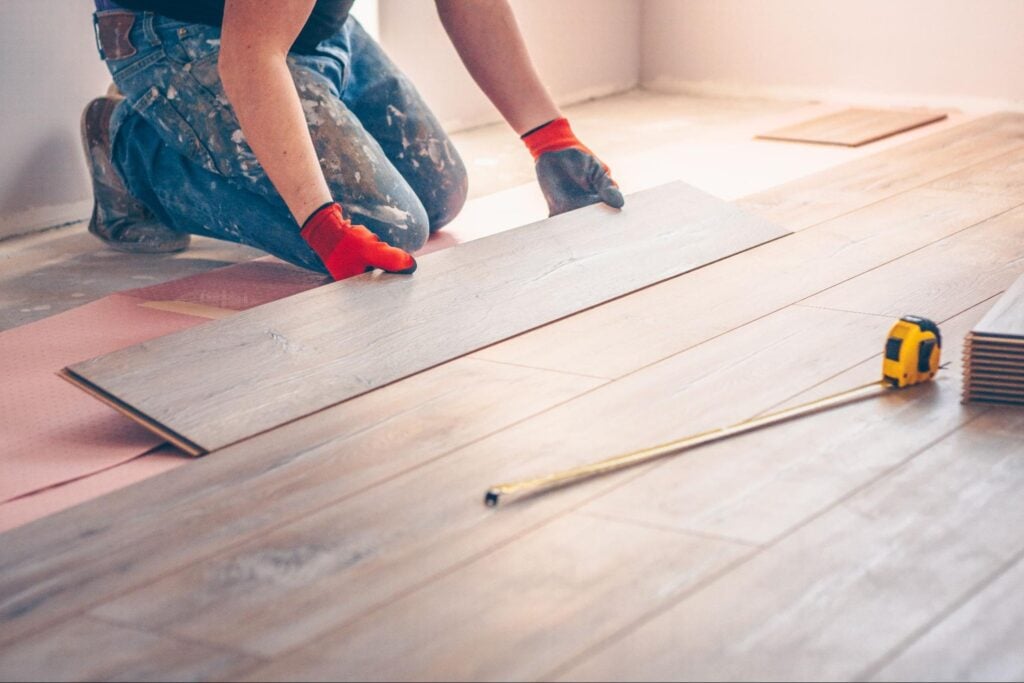

Selecting the right flooring installer can make a huge difference in the quality, durability, and appearance of your new floors. From ensuring a smooth, lasting finish to preventing issues like uneven surfaces, the right installer is an important partner in creating a space you’ll love for years to come.
At 50Floor, we understand the importance of choosing a professional installer, and we’re here to help make the process straightforward and stress-free. Reach out to us today for guidance on your next flooring project!
When it comes to finding the right fit, here are some key questions to help you make an informed choice.
1. What Experience Do You Have with My Chosen Flooring Material?
Flooring installation requires specific skills that vary with different materials. For example:
- Hardwood needs expertise in sanding, finishing, and acclimating the wood to the room’s humidity.
- Tile installation involves precision in spacing and cutting for a clean look.
- Carpet requires stretching and anchoring techniques for a snug fit.
Knowing the installer’s experience with your selected material helps ensure they can handle any specific requirements. An installer experienced in your chosen flooring will understand common issues and know how to avoid them, leading to a smoother, high-quality installation.
2. Are You Licensed and Insured?
Licensing and insurance are essential to protect you and your property. A licensed installer has met the standards and training required to work in your area, which can provide peace of mind about the quality of work.
Insurance is equally important, covering any property damage or injuries that might occur during the job. Before hiring, confirm that the installer holds:
- Licensing required by your state or local government
- Liability insurance to cover potential property damage
- Workers’ compensation insurance if they have a team working on-site
3. Can You Provide References and Customer Reviews?
A reputable flooring installer should be able to share references or reviews from recent clients. Positive feedback from past customers is a strong indicator of reliable service and quality craftsmanship.
Look for installers who can provide:
- References from projects similar to yours
- Photos of previous work to assess their skill level and style
- Clear, consistent communication regarding timelines, budgets, and any changes in the project
4. What’s Included in the Installation Estimate?
An estimate should outline all costs, helping you understand what to expect without hidden fees. Ask the installer to clarify what is included in their quote, such as:
- Labor and material costs
- Removal and disposal of old flooring (if needed)
- Charges for moving furniture during installation
- Subfloor preparation costs, if repairs or leveling are needed
Knowing the full scope of the estimate will help you avoid unexpected charges and ensure that your project stays within budget.
5. How Long Will the Project Take?
Timelines can vary based on the flooring type, room size, and whether any additional prep work is needed.
Ask your installer for an estimated start and end date, and find out if they foresee any potential delays. This will help you plan your schedule and ensure a smooth installation process. Experienced installers will provide a realistic timeframe and keep you updated throughout the project.
6. How Do You Handle Subfloor Preparation?
The subfloor supports your flooring, and its condition can significantly affect the final result. An experienced installer will check for any subfloor issues, like moisture or unevenness, and address them before laying the new flooring. Confirm that the installer includes subfloor assessment and preparation as part of the service, and ask if there are any additional charges for this step if repairs are needed.
7. What Type of Tools and Techniques Do You Use?
The right tools and techniques make all the difference in achieving a seamless, professional finish. Specialized tools like sanders for hardwood, wet saws for tile, and stretchers for carpet ensure that each flooring type is installed correctly.
A skilled installer will be familiar with:
- Tools specific to your flooring type
- Techniques to prevent gaps, uneven edges, or bubbles
- Proper methods for challenging areas, such as around corners or staircases
This attention to detail can greatly enhance the look and durability of your floors.
8. What Maintenance Does This Flooring Require?
Different types of flooring come with their own maintenance needs. Hardwood may require occasional refinishing, while carpet benefits from regular deep cleaning. A knowledgeable installer can provide guidance on how to care for your floors so they stay beautiful and last longer.
Ask for specific tips on:
- Cleaning methods and recommended products
- Preventing scratches, dents, or stains
- Professional maintenance schedules, if applicable (e.g., refinishing or resealing)
9. What Kind of Warranty Do You Offer?
Warranties protect your investment and demonstrate the installer’s confidence in their work. While many flooring materials come with a manufacturer’s warranty, a reputable installer may also offer a guarantee on their installation services.
Be sure to clarify:
- Warranty coverage for both materials and labor
- Duration of the warranty and what it covers
- Conditions that may void the warranty, like improper cleaning methods
Having a clear understanding of the warranty can save you from unexpected costs if any issues arise later.
10. How Do You Handle Unexpected Problems?
Sometimes, unexpected issues like moisture, leveling complications, or structural damage may be discovered mid-project. A skilled installer will have a plan for handling such surprises and will communicate with you before proceeding with any additional work. Discuss how they address unexpected issues and make sure they will seek your approval if extra costs arise.
Final Thoughts
Choosing the right flooring installer involves more than finding someone with tools and experience. It’s about selecting a professional who values quality, respects your home, and communicates clearly.
By asking the right questions, you’re setting yourself up for a successful, smooth installation that will bring lasting value and beauty to your space. At 50Floor, we believe in guiding homeowners through each step of their flooring journey, ensuring satisfaction with every project.
Contact us today to get started on your flooring installation with a team you can trust.
FAQs
- Do flooring installers handle moving furniture, or should I prepare the space beforehand?
Most installers prefer a clear workspace to start the job efficiently. Some companies may offer furniture-moving services for an added fee, but this is not always standard. Check with your installer ahead of time so you know what to expect and, if necessary, make arrangements to have the space cleared before installation day.
- How can I tell if my subfloor needs repairs before installation?
Signs that your subfloor may need attention include squeaking, visible cracks, or sagging areas. Although a professional installer will usually inspect the subfloor as part of the installation process, you can mention any noticeable issues when they come to assess your project. Addressing subfloor problems in advance helps ensure your new flooring looks and feels smooth.
- What should I expect in terms of noise and dust during flooring installation?
Flooring installation can be noisy, especially with tools like saws, sanders, and nail guns. Dust and debris are common, particularly with wood or tile. Ask your installer if they use dust containment measures or provide cleanup services. Covering doorways and vents can help contain dust in one area of your home.
- How soon after installation can I walk on my new floors or move furniture back?
This depends on the type of flooring. For example, hardwood may need time for finishing to cure, while vinyl or tile is often ready for light use shortly after installation. Your installer can give you specific guidelines, helping you avoid premature wear or damage by waiting the recommended amount of time.
- What steps should I take if my new flooring has an issue after installation?
If you notice issues like buckling, uneven edges, or unexpected gaps, reach out to your installer immediately. Document the problem with photos, and check the warranty terms provided by both the installer and material manufacturer. Reliable installers will address post-installation concerns and work with you to correct them.



